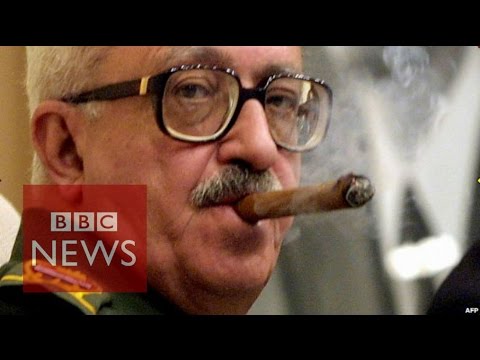 Tariq Aziz, known as the face of Saddam Hussein’s regime on the world stage for many years, has died in an Iraqi hospital, officials say.
Tariq Aziz, known as the face of Saddam Hussein’s regime on the world stage for many years, has died in an Iraqi hospital, officials say.
Aziz, 79, served as foreign minister and deputy prime minister and was a close adviser to the former leader.
He was sentenced to death by the Iraqi Supreme Court in 2010 for the persecution of religious parties under Saddam’s rule but was never executed.
He surrendered to US troops in 2003 shortly after the fall of Baghdad.
A local health official told reporters that he was taken to hospital from prison after suffering a heart attack. Initial reports said he had died in prison.
He had long been in poor health, suffering from heart and respiratory problems, high blood pressure and diabetes, and his family repeatedly called for his release from
His wife, Violet, had visited him in prison on Thursday, their daughter Zeinab told the AP news agency.
She said her father had suffered several strokes that left him confined to a wheelchair and unable to speak during her parents’ final meeting.
“He didn’t move. He couldn’t talk. He didn’t say a word to her. He just looked at her,” said Zeinab, adding: “It is so sad that he had to go this way.”
‘Eight of spades’
Aziz, who was known for his black-rimmed glasses and love of cigars, first came to prominence while serving as foreign minister during the first Gulf War in 1991.
As a Christian in a mainly Sunni Muslim government, he was not considered a member of Saddam Hussein’s innermost circle.
A fluent English speaker, he played a vocal role before the US invasion of Iraq in 2003, meeting Pope John Paul II in the Vatican to call for peace.
But when Baghdad fell, his lack of influence was reflected in his lowly ranking as the eight of spades in the US military’s famous “deck of cards” used to identify the most-wanted players in Saddam’s regime.
Tariq Aziz was one of the most visible of Saddam Hussein’s lieutenants and, it seems, one of the most loyal.
He frequently represented Iraq on the international stage, speaking fluent English and giving a monstrous regime an urbane, often charming face. And like Saddam, he was often seen puffing on fat Cuban cigars.
When Iraq found itself in dock, as it did after its invasion of Kuwait in 1990, it invariably fell to Tariq Aziz to explain Saddam’s actions to an exasperated world. He did it doggedly, often infuriatingly, for decades.
As an ethnic Chaldean from northern Iraq, he was also the only Christian member of Saddam’s entourage, which made him useful as an envoy for an secular regime. It also made him an outsider in Baghdad.
Western diplomats never doubted his loyalty to Saddam, but wondered how much he really knew about his master’s secrets.
Read More…. http://www.bbc.com/
Tariq Aziz died : 28 April 1936 – 5 June 2015
baptized Manuel Christo; 28 April 1936 – 5 June 2015) was an Iraqi Foreign Minister (1983–1991) and Deputy Prime Minister (1979–2003) and a close advisor of President Saddam Hussein. Their association began in the 1950s when both were activists for the then-banned Arab Socialist Ba’ath Party. Although he was an Arab Nationalist he was in fact an ethnic Chaldean, and a member of the Chaldean Catholic Church.
Because of security concerns, Saddam rarely left Iraq, so Aziz would often represent Iraq at high-level diplomatic summits. What the United States wanted, he averred, was not “regime change” in Iraq but rather “region change”. He said that the Bush Administration’s reasons for war were “oil and Israel.”
After surrendering to American forces on 24 April 2003, Aziz was held in prison, first by American forces and subsequently by the Iraqi government, in Camp Cropper in western Baghdad.[5] He was acquitted of some charges on 1 March 2009 following a trial, but was sentenced to 15 years on 11 March 2009 for the executions of 42 merchants found guilty of profiteering in 1992 and another 7 years for relocating Kurds.
On 26 October 2010, he was sentenced to death by the Iraqi High Tribunal, which sparked regional and international condemnation from Iraqi bishops and other Iraqis, the Vatican, the United Nations, the European Union and the human rights organization Amnesty International, as well as various governments around the world, such as Russia. On 28 October 2010, it was reported that Tariq Aziz, as well as 25 fellow prison inmates, had begun a hunger strike to protest the fact that they could not receive their once-monthly visit from friends and relatives, which was normally set for the last Friday of each month.
On 17 November 2010, it was reported that Iraqi President Jalal Talabani declared that he would not sign Aziz’s execution order, thus commuting his sentence to indefinite imprisonment.
Reference: http://en.wikipedia.org/wiki/Tariq_Aziz







